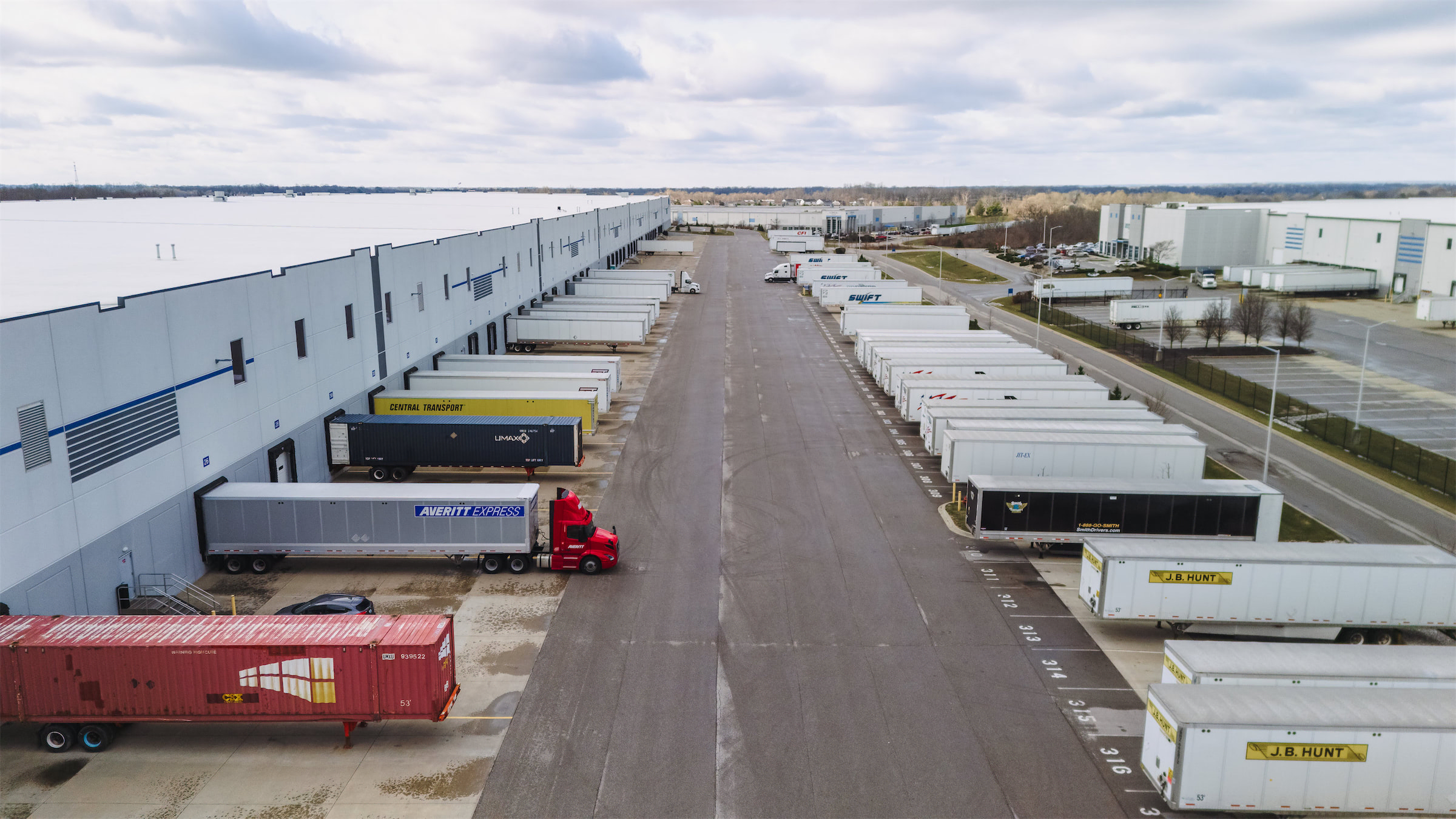AOG Support: How Strategic Warehouse Placement Minimizes Aircraft Downtime

Every minute an aircraft sits grounded costs airlines $10,000 to $150,000 in lost revenue and cascading disruptions. Discover how strategic warehouse placement, high-security storage, and 24/7 AOG response capabilities keep aircraft flying and contracts secure.
Every minute an aircraft sits on the ground costs money—thousands of dollars per hour in lost revenue, cascading schedule disruptions, stranded passengers, and crew overtime. When that grounding stems from a missing or damaged part, the term "Aircraft on Ground" (AOG) triggers an all-hands response that can make or break supplier relationships. In the high-stakes world of aerospace logistics, the difference between a 2-hour and 24-hour AOG resolution often comes down to one factor: strategic warehouse placement.
The aerospace aftermarket has evolved into a complex ecosystem where MRO providers, parts suppliers, and airlines demand near-instantaneous response to AOG situations. Traditional distribution models that work for other industries crumble under aerospace's unique pressures: extreme service level requirements, stringent documentation needs, absolute quality demands, and the geographic dispersion of aircraft requiring support. When an aircraft breaks down in Cincinnati, waiting for a part to ship from Seattle isn't an option.
For aerospace supply chain managers, optimizing AOG support has become a critical differentiator. The companies that can consistently deliver the right part, with the right documentation, in the shortest possible time, earn preferred supplier status and long-term contracts. Those that can't find themselves relegated to commodity supplier status or worse—completely out of the aerospace market.
The True Cost of Aircraft Downtime
Understanding the economics of aircraft downtime reveals why AOG support demands such extreme urgency. According to Boeing estimates, AOG situations can cost airlines between $10,000 to $150,000 per hour, depending on the aircraft type and route. These direct costs only scratch the surface of the true impact.
Schedule disruption costs multiply the initial impact exponentially. A single delayed flight creates a domino effect: subsequent flights are delayed, crews exceed duty time limits requiring replacements, passengers miss connections requiring rebooking and accommodation, and aircraft are out of position for scheduled maintenance or route optimization. Airlines calculate that each hour of delay impacts an average of 150-300 passengers across the network.
Reputation damage from repeated delays or cancellations has long-term revenue implications that dwarf immediate costs. In today's social media environment, a mechanical delay quickly becomes a public relations crisis. Business travelers—airlines' most profitable customers—show little tolerance for reliability issues, often switching carriers after just two or three negative experiences.
Regulatory compliance adds another dimension to AOG urgency. Aircraft operating outside maintenance intervals face grounding by aviation authorities, while repeated technical delays trigger enhanced oversight. The administrative burden of explaining and documenting delays to regulators consumes valuable management resources better spent on operations improvement.
Strategic Warehouse Placement Principles
The foundation of effective AOG support lies in strategic warehouse placement that balances coverage, cost, and capability. Unlike traditional distribution networks optimized for cost efficiency, AOG networks must prioritize service speed even at premium costs.
Commonwealth's aerospace logistics capabilities are designed with these priorities in mind. The company "offers 24/7 AOG support with rapid response times to minimize aircraft downtime." This round-the-clock availability proves essential since aircraft failures don't follow business hours—a part needed at 2 AM is just as critical as one needed at 2 PM.
Geographic positioning relative to maintenance bases and high-traffic airports determines AOG response capability. Parts must be within 2-4 hours of major maintenance operations to meet typical AOG response requirements. This proximity requirement often conflicts with traditional warehouse economics that favor centralized distribution, forcing aerospace companies to maintain multiple stocking locations or partner with strategically positioned 3PL providers.
Commonwealth's strategic Greater Cincinnati location offers particular advantages for aerospace AOG support. The region's central position provides access to multiple major airports and maintenance facilities throughout the Midwest. Cincinnati/Northern Kentucky International Airport itself serves as a major cargo hub, enabling rapid air freight connections when parts must move beyond ground transportation range.
Multi-modal access amplifies location value for AOG operations. While air freight often handles urgent AOG shipments, ground transportation provides cost-effective options for less critical deliveries or pre-positioning of inventory. Commonwealth's transportation capabilities spanning truck, rail, and intermodal services enable optimized response based on urgency and cost considerations.
High-Security Storage Requirements
Aerospace components demand security levels that exceed standard warehousing by orders of magnitude. The combination of extreme component values—some parts exceed $1 million—and potential safety implications of counterfeit or compromised parts creates non-negotiable security requirements.
Commonwealth's aerospace facilities feature "high-security storage areas for valuable components" with "stringent security measures including restricted access areas, 24/7 surveillance, and thorough employee background checks." These multilayered security approaches address both external threats and internal risks that could compromise component integrity.
Physical security extends beyond simple access control to include segregated storage areas for different customers or component categories, tamper-evident packaging and storage protocols, chain of custody documentation for component movement, and restricted access that limits exposure to authorized personnel. These measures ensure components remain secure and uncompromised throughout storage.
Cybersecurity has become equally critical as aerospace logistics digitizes. Component databases containing serial numbers, maintenance histories, and certification documents represent valuable targets for industrial espionage or counterfeiting operations. Professional aerospace logistics providers maintain robust cybersecurity programs protecting both physical and digital assets.
Background screening for personnel handling aerospace components goes beyond standard employment verification. Given the potential safety implications of compromised parts, aerospace facilities typically require comprehensive criminal background checks, drug testing programs, and security clearances for sensitive military components. This human element of security proves as important as physical and digital protections.
Documentation and Traceability Excellence
In aerospace logistics, documentation isn't just paperwork—it's the foundation of airworthiness. Every component must carry complete documentation proving its authenticity, maintenance history, and compliance with applicable regulations. Missing or incorrect documentation can ground an aircraft as surely as a failed component.
Commonwealth emphasizes their capability for "detailed tracking of individual parts, including serial numbers, lot codes, and full chain of custody documentation." This granular tracking capability proves essential for aerospace components where every movement must be documented and every handler identified. The ability to provide complete component history on demand can mean the difference between immediate installation and lengthy verification processes.
Certification management adds complexity to aerospace documentation. Components must carry appropriate certificates of conformity, airworthiness tags (Form 8130-3 or equivalent), service bulletins compliance, and modification status records. Professional aerospace warehouses maintain systems to track certificate expiration dates, ensuring documentation remains current throughout storage periods.
Electronic documentation systems have become essential for managing aerospace paperwork volume. Modern providers maintain digital repositories where certificates, test reports, and maintenance records can be instantly accessed and transmitted. This digitization accelerates AOG response by eliminating delays associated with locating and transmitting physical documents.
Regulatory compliance documentation requirements vary by jurisdiction and aircraft type. Parts moving internationally require export licenses and customs documentation. Military components need additional security and compliance certificates. Professional providers understand these varying requirements and maintain appropriate documentation for different scenarios.
Climate Control for Sensitive Components
Aerospace components often require precise environmental control to maintain airworthiness. From electronic avionics sensitive to humidity and static discharge to rubber seals that degrade with temperature extremes, improper storage conditions can render expensive components unusable.
Commonwealth's aerospace warehouses include "climate-controlled environments for sensitive parts." This capability extends beyond basic temperature control to encompass humidity management for corrosion prevention, static control for electronic components, clean room protocols for sensitive instruments, and vibration isolation for calibrated equipment.
Temperature cycling poses particular risks for aerospace components. Repeated expansion and contraction can cause seal failures, electronic component degradation, and calibration drift in precision instruments. Professional aerospace storage facilities maintain tight temperature controls that minimize cycling while ensuring consistent conditions year-round.
Humidity control prevents both corrosion and moisture absorption that could affect component performance. Many aerospace specifications require storage between 30-60% relative humidity, with some sensitive components demanding even tighter ranges. Maintaining these conditions requires sophisticated HVAC systems with precise control capabilities.
Contamination prevention adds another dimension to aerospace storage requirements. Hydraulic components must be protected from particulate contamination that could cause system failures. Optical components require dust-free environments. Some components need protection from electromagnetic interference. Professional facilities understand these varied requirements and maintain appropriate storage conditions.
Kitting and Value-Added Services
AOG response often requires more than simply shipping individual components. Aircraft maintenance frequently needs complete kit assemblies, properly configured components, or pre-positioned consumables that enable rapid repair completion.
Commonwealth's aerospace services include "kitting and sub-assembly services" that can accelerate maintenance operations. By pre-assembling commonly needed component sets, warehouses can ship complete repair kits rather than individual parts. This approach reduces picking and shipping time during AOG events while ensuring all necessary components are included.
Quality control inspections and documentation services add value while components are in storage. Commonwealth offers "quality control inspections and documentation" that can verify component condition, update maintenance records, and ensure documentation completeness. These services prove particularly valuable for rotable components cycling through repair processes.
Custom packaging and crating for sensitive components protects valuable aerospace parts during shipment. Standard packaging often proves inadequate for delicate avionics or precision mechanical components. Professional providers understand aerospace packaging requirements and can create solutions that protect components while meeting shipping regulations.
Inventory management and vendor-managed inventory (VMI) programs help airlines and MRO providers optimize their component stocks. By maintaining ownership of components until consumption, suppliers can position inventory strategically without forcing customers to tie up capital. These programs prove particularly effective for high-value, low-turnover components common in aerospace.
Technology Integration and Real-Time Visibility
Modern AOG support depends on technology that provides instant visibility into component availability, location, and status. The ability to quickly locate and allocate parts across multiple stocking locations can dramatically reduce aircraft downtime.
Commonwealth notes their capability for "integration with aerospace-specific ERP systems," recognizing that aerospace companies often use specialized systems designed for the industry's unique requirements. These integrations must handle complex part numbering schemes, extensive certification tracking, serialized component management, and sophisticated warranty and service contract terms.
Real-time inventory visibility across the distribution network enables effective AOG response. When an aircraft fails, support teams need immediate answers: Is the part available? Where is it located? What's the certification status? How quickly can it reach the aircraft? Modern systems provide these answers instantly, enabling rapid decision-making during critical AOG events.
Mobile technology has become essential for AOG operations. Field service representatives need access to inventory systems, documentation, and shipping status from aircraft hangars or remote locations. Cloud-based systems accessible via tablets or smartphones enable real-time coordination between field teams and warehouse operations.
Predictive analytics help prevent AOG situations by identifying components likely to fail. By analyzing component history, flight hours, and maintenance patterns, advanced systems can recommend pre-positioning of parts likely to be needed. This proactive approach reduces both AOG frequency and resolution time.
International Considerations and Compliance
Aerospace logistics frequently crosses international borders, adding layers of complexity to AOG support. Components must move quickly through customs while maintaining compliance with export controls, aviation regulations, and security requirements.
Commonwealth's mention of "customs clearance support for international shipments" acknowledges this critical capability. Understanding harmonized tariff codes for aerospace components, maintaining appropriate export licenses, managing country-specific documentation requirements, and coordinating with customs brokers for rapid clearance all prove essential for international AOG support.
Export control compliance has become increasingly complex with evolving regulations around dual-use technologies. Many aerospace components fall under ITAR (International Traffic in Arms Regulations) or EAR (Export Administration Regulations) controls, requiring careful management of technical data and physical components. Professional providers maintain compliance programs ensuring lawful international component movement.
Free trade zones and bonded warehouses can facilitate international AOG support by pre-positioning inventory without triggering import duties. These facilities allow components to be stored near international airports, ready for rapid deployment when needed. Understanding how to leverage these facilities requires expertise in international trade regulations.
Cultural and language considerations impact international AOG coordination. Supporting aircraft in different countries requires understanding local business practices, time zones, and communication preferences. Professional providers maintain multilingual support capabilities and understand cultural nuances that can impact AOG response effectiveness.
Building Resilient AOG Networks
Creating resilient AOG support networks requires more than individual warehouse locations—it demands coordinated capabilities that can respond to various failure scenarios. Redundancy, flexibility, and scalability ensure consistent service even during unusual circumstances.
Commonwealth's network of facilities provides redundancy for critical aerospace inventory. If one facility faces capacity constraints or operational issues, others can provide backup support. This network approach proves particularly valuable during weather events or other disruptions that might impact individual locations.
The flexibility to leverage both contract and public warehousing enables scalable AOG support. Contract warehousing provides dedicated resources for high-volume, consistent operations, while public warehousing offers surge capacity for new programs or unexpected demand spikes.
Partnership networks extend AOG capabilities beyond individual providers. By maintaining relationships with other logistics providers, airlines, and MRO facilities, professional 3PLs can access additional resources when needed. These partnerships prove invaluable during complex AOG events requiring capabilities beyond any single provider.
Continuous improvement drives AOG network enhancement. Regular analysis of response times, success rates, and customer feedback identifies optimization opportunities. Professional providers maintain formal improvement programs that systematically enhance AOG capabilities over time.
Transform Your Aerospace AOG Support
Aircraft on Ground situations demand logistics capabilities that go far beyond standard warehousing and distribution. From 24/7 availability and strategic positioning to high-security storage and precise documentation management, successful AOG support requires specialized expertise and infrastructure that many aerospace companies struggle to maintain internally.
Commonwealth Inc. brings proven aerospace logistics capabilities designed specifically for AOG support and critical component management. Our strategic Midwest locations, high-security storage areas, climate-controlled environments, and 24/7 AOG support provide the foundation for minimizing aircraft downtime. Whether you need to pre-position critical spares, manage rotable pools, or ensure rapid response to AOG events, we have the capabilities and expertise to keep aircraft flying.
Don't let inadequate logistics support ground your aerospace operations. Contact Commonwealth Inc. today to discover how our specialized aerospace logistics services can enhance your AOG response capabilities while optimizing your aerospace supply chain.
Frequently Asked Questions
What AOG support capabilities does Commonwealth offer?
Commonwealth offers 24/7 AOG support with rapid response times to minimize aircraft downtime. Our strategic locations, comprehensive transportation options, and dedicated aerospace storage capabilities enable quick response to critical component requirements at any hour.
How does Commonwealth ensure security for high-value aerospace components?
We employ stringent security measures including restricted access areas, 24/7 surveillance, and thorough employee background checks to protect high-value and sensitive items. Our high-security storage areas are specifically designed for valuable aerospace components.
What documentation and traceability capabilities does Commonwealth provide?
Our advanced inventory management system allows for detailed tracking of individual parts, including serial numbers, lot codes, and full chain of custody documentation. This comprehensive tracking ensures complete traceability as required by aerospace regulations.
Can Commonwealth handle large aerospace components?
Yes, our facilities are equipped with specialized handling equipment and storage areas to accommodate large aerospace components safely. We understand the unique requirements of oversized aerospace parts and have the infrastructure to handle them properly.
Does Commonwealth offer climate-controlled storage for sensitive avionics?
Yes, we maintain climate-controlled environments for sensitive parts. This includes temperature and humidity control essential for protecting electronic components, rubber seals, and other environmentally sensitive aerospace materials.
What value-added services does Commonwealth offer for aerospace?
We offer specialized services including kitting and sub-assembly services, quality control inspections and documentation, customs clearance support for international shipments, specialized packaging and crating, inventory management and VMI programs, reverse logistics for repairs and warranty claims, serial number tracking and lot control, and integration with aerospace-specific ERP systems.
How do Commonwealth's locations benefit aerospace distribution?
Our strategic Greater Cincinnati locations provide excellent access to major airports and maintenance facilities throughout the Midwest. The proximity to Cincinnati/Northern Kentucky International Airport—a major cargo hub—enables rapid air freight connections for urgent AOG shipments.
Can Commonwealth support international aerospace shipments?
Yes, we provide customs clearance support for international shipments. Our team understands the complex documentation requirements for international aerospace components and can facilitate smooth customs clearance for AOG and routine shipments.
Does Commonwealth maintain industry certifications for aerospace?
Commonwealth states they "maintain relevant industry certifications and stay up-to-date with aerospace regulations." Contact us to discuss specific certification requirements for your aerospace logistics needs.
How quickly can Commonwealth respond to AOG situations?
With 24/7 availability and rapid response capabilities, we can quickly mobilize to support AOG events. Our strategic locations enable ground delivery to many Midwest locations within hours, while our proximity to air cargo facilities supports expedited shipping to more distant locations.
Recent blogs

5 Signs You've Outgrown Your Current Warehouse Solution
It happens gradually, then suddenly. Your once-adequate warehouse operation starts showing stress fractures—orders ship late, inventory accuracy declines, costs creep upward. Here are some signs it's time for a change.

Converting Fixed Costs to Variable: The Financial Impact of Outsourced Warehousing
The holy grail of financial management is achieving perfect cost variability; expenses that scale precisely with revenue. Discover how converting to variable costs fundamentally changes your financial risk profile.

Peak Season Playbook: Scaling Warehouse Operations
Every operations manager knows the peak season paradox: you need double the warehouse capacity and triple the labor force for three months, but you can't afford to maintain those resources year-round. This guide reveals proven strategies for scaling efficiently during demand spikes while controlling costs.
Arrange a visit
See the Commonwealth difference in action
We believe the best way to understand our capabilities is to experience them firsthand. We invite you to tour one of our facilities, meet our team, and discover how Commonwealth can optimize your logistics operations. Let us show you why so many businesses trust us with their supply chain needs.
Let’s optimize your supply chain together
At Commonwealth, we're committed to providing tailored logistics solutions that meet your unique business needs. Whether you have a question about our services, want to request a quote, or are ready to schedule a facility tour, our team is here to help.